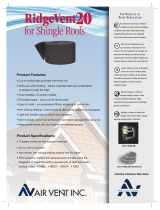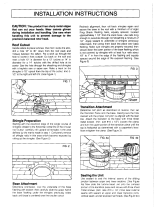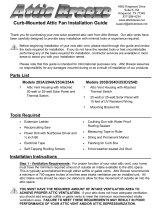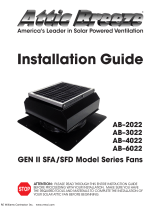
WHY RIDGE VENTS?
Two reasons to always use a ridge vent whenever possible: performance and appearance.
Years of research have proven that Air Vent ridge vents combined with sufficient intake
vents is the most efficient and effective system you can install. This balanced system of
intake and exhaust through the attic provides greater airflow than any other non-powered
vent system — and it’s the most attractive system. They blend in nicely with the roofline.
5 Wind Turbines
To provide the same ventilation
as 42 linear feet of ridge vent,
five wind turbines would be
necessary — resulting in an
unattractive roofline.
15 Roof Louvers
In order to provide the same
ventilation as 42 linear feet
of ridge vent, 15 roof louvers
would be necessary — creating
quite an eyesore.
42 Feet of Ridge Vent
Located precisely where they
do the most good, at the peak
of the roof, ridge vents are
virtually invisible from ground
level. And they provide greater
airflow than other vents.
Unbaffled Ridge Vents
n Wind and elements can blow directly in through the
ridge vent. Air entering the vent can create pressure in
the attic which prevents air and moisture from being
pulled out.
n Strong winds can actually pass through one side of
the vent and out the other, also preventing air and
moisture from escaping the attic.
NOT ALL RIDGE VENTS ARE THE SAME
In independent tests against competitive ridge vents, Air Vent products produced
the greatest amount of low pressure above the vent, which resulted in a greater ability
to exhaust air from the attic. Two unique features contribute to the superior
performance of Air Vent ridge vents:
1) The External Wind Baffle creates low pressure to “pull” air out of the attic, and
helps prevent windblown rain and snow infiltration.
Effective attic ventilation can help fight
excess heat and moisture before they
become serious problems:
n Heat and moisture can cause roof
structures, shingles and paint to
deteriorate prematurely;
n Excessive heat causes air conditioners
to run more;
n Excessive moisture can lower the
R-value of some insulation;
n Uneven roof temperatures can cause
the formation of ice dams;
n And proper ventilation is required
to validate the warranty coverage
for most roofing shingles.
WHY VENTILATE THE ATTIC?
170°
Roof Sheath
Temperature
140° Attic
Temperature
115° Attic
Temperature
2) The Internal Weather Filter deflects rain, snow and
insects to provide a more complete weather barrier.
Unlike a furnace filter it’s not treated with any oils
or chemicals.
Internal
weather
filter
AIR VENT RIDGE VENTS
n External baffle enhances airflow and provides weather protection
n Internal weather filter provides a more complete barrier against weather, insects & debris
n 4-foot shingle-over; made of durable, molded high-impact copolymers
n Built-in ventilating end plug
n Lifetime limited warranty and 5-year Replacement Plus
™
Protection
VARIETY OF MODELS TO CHOOSE FROM
1. ShingleVent II is 12" wide for conventional shingle-over applications.*
2. ShingleVent II-9 is 9" wide for enhanced ridge cap shingles, cedar shake or cedar shingle applications.
3. ShingleVent II-7 is 7" wide for narrow enhanced ridge cap shingles.
4. ShingleVent II-9A and II-7A are both approved for Class A
roof decks for 9" and 7" ridge cap shingles.
*Available with a bag of ring shank nails taped to each 4-foot piece
VenturiVent
™
Plus
VenturiVent
™
Roll
n External baffle & internal weather filter
n Nail gun friendly with 2 coils of nails
n 28-foot roll shingle-over
n Built-in ventilating end plug
n Limited Lifetime Warranty and 5-year
Replacement Plus
™
Protection
n Ridge vent for diagonal hips
n 4-foot shingle-over
n Integrated gasket protects against water
infiltration
n External wind baffle & internal weather filter
n Built-in ventilating end plug
n Integrated rain diverter
n Limited Lifetime Warranty and 5-year
Replacement Plus
™
Protection
DESIGNING THE BALANCED SYSTEM
®
FOR ATTIC VENTILATION
Research has shown that the best way to
ventilate an attic is with a system that
provides continuous airflow along the
entire underside of the roof sheathing.
Achieving this desired airflow requires a
balanced system of intake ventilation
low at the roof’s edge or in the
soffit/eaves and exhaust ventilation at the ridge. Air Vent offers a variety of
high performance intake vents including our Edge
™
Vent (see back page).
For optimum attic ventilation for today’s tighter built, tighter remodeled
homes that have more efficient building materials, Air Vent recommends
exceeding allowable minimum building codes.** Air Vent recommends one
square foot of ventilation for every 150 square feet of attic floor space with
half the ventilation represented by intake vents and half by exhaust vents
such as ridge vents.
To determine how many feet of net free area you need for a balanced ridge
vent/intake vent system, use this formula:
To determine how many linear feet of Air Vent’s ShingleVent II
you need, use this formula:
½ net free area needed x 144 ÷ 18 = minimum feet of ShingleVent II
To determine how many linear feet of Air Vent’s Edge Vent intake vent you
need, use this formula:
½ net free area needed x 144 ÷ 9 = feet of The Edge Vent needed
Sq. ft. of attic floor space
= Sq. ft. of net free
150 area needed
** For allowable minimum building code requirements use the 1/300 ratio instead of the
1/150 ratio.
n External baffle
n 4-foot shingle-over
n Built-in ventilating end plug
n Available with a bag of ring shank nails
taped to each 4-foot piece
n Limited Lifetime Warranty and 5-year
Replacement Plus
™
Protection
n External baffle
n Nail gun friendly with 2 coils of nails
n 28-foot roll shingle-over
n Built-in ventilating end plug
n Limited Lifetime Warranty and 5-year
Replacement Plus
™
Protection
n External baffle
n 20-foot roll shingle-over
n Built-in ventilating end plug
n Limited Lifetime Warranty and 5-year
Replacement Plus
™
Protection
184585_AirVent_AVI023_BPC.qxp_126325_AirVent_AVI023 9/14/18 4:05 PM Page 2















